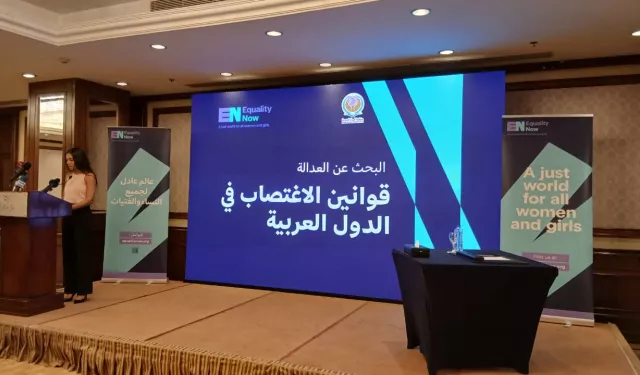None of the 22 Arab League member states explicitly criminalise marital rape, according to a hard-hitting new report by Equality Now, which accuses governments across the region of systematically failing to protect survivors of sexual violence or enshrine adequate legal safeguards against rape.
Launched Tuesday at a Cairo conference titled “In Search of Justice: Rape Laws in Arab States,” the report—produced with the Arab Women Organization, an Arab League affiliate—finds that many legal systems across the region sanction or ignore sexual violence within marriage.
Jordan, the West Bank, and Syria exclude marital relationships from the definition of rape in their penal codes. In Somalia, Sudan, and Yemen, statutes still uphold what they call the “husband’s right to sexual access,” regardless of consent. Egypt’s laws, the report adds, suffer from the same fundamental flaw.
The report concludes that rape laws across the region remain narrow, outdated, and ineffective, and that without comprehensive definitions or proper enforcement, women and girls are left unprotected.
Founded in 1992, Equality Now is a global NGO pushing legal reform to advance gender equality and eradicate sexual violence.
“Before we can talk about equality, women need to feel safe,” said Deema Dabbous, the group’s regional representative for MENA. Speaking at the conference, she warned of a global backlash against women’s rights. “Progress built through decades of advocacy is under threat. Women’s bodies are being weaponized as political battlegrounds. Addressing sexual violence in both private and public spaces is urgent.”
Dabbous added that rape remains a taboo subject in many Arab societies, intensifying the silence around survivors. “The topic is painful and heavily stigmatized, often resulting in silence. But we must confront it directly. Survivors deserve protection, justice, and accountability.”
The report conducts a comparative legal analysis of rape and sexual assault legislation across Arab League states, reviewing penal codes, personal status laws, and legal procedures.
Laws exist, justice falters
The report finds a yawning gap between laws on paper and the lived reality in Egypt and Lebanon. Survivors are regularly met with disbelief, blame, and bureaucratic roadblocks.
Many Arab penal codes define rape narrowly, focusing only on forced vaginal intercourse. Non-consensual anal, oral, or object-based penetration is excluded from the definition. In Djibouti, Lebanon, Libya, Palestine, Somalia, Sudan, and Syria, rape is legally framed around physical force, not voluntary consent.
“In most of the region, rape is defined as penile-vaginal penetration achieved through force,” the report notes. “Other non-consensual acts fall under lesser charges with lighter penalties.”
In Algeria, Iraq, Lebanon, and Syria, remnants of so-called “marry-your-rapist” laws still linger, letting perpetrators escape punishment by marrying their victims. Despite years of advocacy, reforms remain patchy, and some survivors—particularly minors—are pressured into marrying their attackers.
The report also condemns the moral framing common in many Arab legal systems, where rape is treated not as an assault on bodily integrity but as a crime against family “honor” or “public morality.”
‘We advise, not legislate’
Fadia Kiwan, director of the Arab Women Organization, told Al Manassa her group has no legislative power. “We serve as an advisory body. We provide input to national women’s councils and ministries. Our role is to recommend—even when unsolicited. Implementation rests with governments.”
She stressed that responsibility lies squarely with member states. “We urge participants to take this report home, spread its findings, and advocate for reform.”
Kiwan rejected claims that religion or politics are the main obstacles. “The only real barrier is social taboo. There is no moral justification for ignoring these crimes. Sexual violence also harms men, not just women.”
In April, the Egyptian Center for Women’s Rights announced the second draft of a unified law on violence against women, developed with five civil society groups after an eight-year lull.
Tarek Khater, a legal expert and drafting committee member, told Al Manassa that Egypt’s penal code is grossly outdated. “Even the most extreme violence against women is absent from current law. A code nearly a century old cannot reflect today’s understanding of rape.”
Khater pointed to the law’s wording, which limits rape to “vaginal penetration against a female’s will.” The maximum penalty is life imprisonment or execution. “This ignores the full spectrum of violent, non-consensual acts. It fails victims and undermines justice.”
The Equality Now report closes with a forceful call to action. It urges Arab League member states to redefine rape around consent, in line with international human rights standards.
“This conversation is long overdue,” Dabbous said. “Governments must move quickly to reform their rape laws, protect survivors, and ensure meaningful enforcement.”
